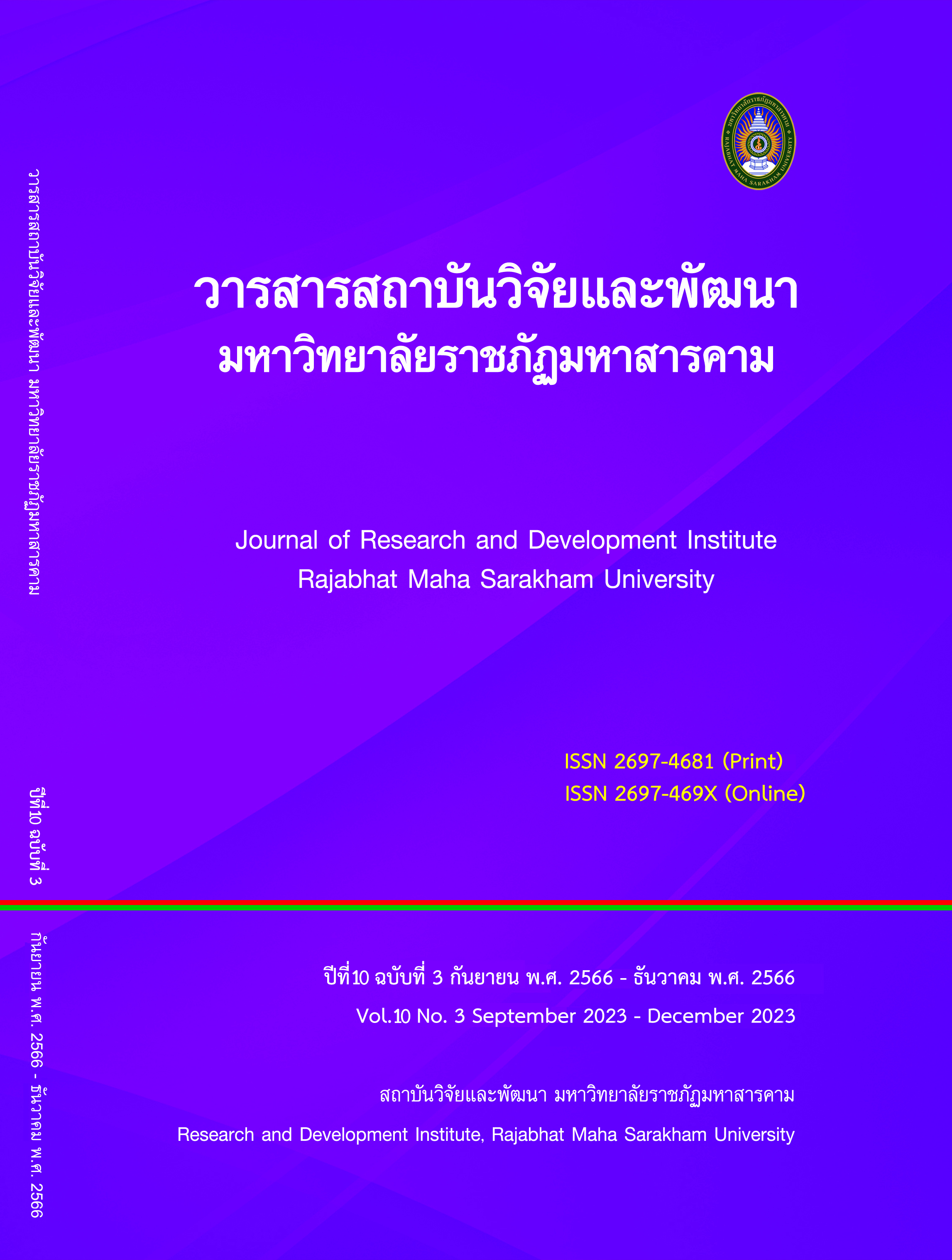THE DEVELOPMENT OF A SUPPLEMENTARY COURSE IN CH16203 KNOWLEDGEABLE IN CHINESE CULTURAL TO DEVELOP CROSS CULTURE COMMUNICATION AND ANALYTICAL THINKING SKILL USING BRAIN BASED LEARNING WITH FLIPPED CLASSROOM FOR GRADE 6TH STUDENTS
Keywords:
Develop cross culture communication, Analytical thinking skill, Brain based learning, flipped classroomAbstract
The purpose of this research were 1) to develop supplementary course in CH16203 Knowledgeable in Chinese Cultural to develop cross culture communication. To develop cross culture communication and critical thinking skills using a Brain-Based Learning with Flipped classroom of grade 6 students 2) develop students' cross culture communication skills that have been an average score of not less than 70% and the number of students passing the criteria of 70% or more. 3) Develop students' analytical thinking skill that have been learned to have an average score of not less than 70% and the number of students passing the criteria of 70% or more. The target group include school administrators, teachers, and grade 6 students. This research was research and development (R&D) The instruments used are 1) Additional course development needs questionnaire Ch16203 Knowledgeable in Chinese Cultural 2) Additional course Ch16203 Knowledgeable in Chinese Cultural 3) lesson plans 4) listening test for Cross-Cultural Communication Skills 5) Speaking skill Assessment form Cross-Cultural Communication 6) The test to measure the analytical thinking skills 7) a curriculum evaluation form
The results of the research found that
- Results of the development of additional courses CH16203 Knowledge found that there was a high level of suitability, the mean (𝑥̅ = 4.28 , S.D. = 0.23).
- Students had average cross-cultural communication skills score of 22.27 representing 74.33 percent and there are 26 students who passed the criteria representing 86.67 percent, which is higher than the specified criteria.
- The students had scores on analytical thinking skills of 14.43, representing 72.12 percent, and there were 22 students who passed the criteria, representing 73.33%, which was higher than the set criteria.
References
Angkhasanyalak, Y. (2017) effects of organizing thai language learning activities by using 5-step process on analytical thinking ability and active learning attitudes of tenth grade students. Bangkok : Chulalongkorn University.
Brown, douglas h. 2000. principles of language learning and teaching. new york: longman
Caine, R., and Caine, G. (1990).Understanding a Brain-Based Approach to Learning and Teaching. Educational Leadership. Vol. 48, No. 2, pp. 66-70.
Dahl, S. (2005). Intercultural Research: The Current State of Knowledge. Retrieved December 15, 2021, from http://papers.ssrn.com/sol3/ papers.cfm?abstract_id=658202
Gudykunst, W.B. & Kim, Y.Y. (1992, 1984). Communicating with Strangers. New York: McGraw-Hill.
Hughes, George H. 1988. An argument for culture analysis in the second language classroom. In Joyce M. Valdes, ed., Culture Bound: Bridging the Culture Gap in Language Teaching. New York: Cambridge University Press.
Jiang, X. (2006). Towards intercultural communication: from micro to macro perspectives. Intercultural Education
Mariam nilphan. (2012). research synthesis in curriculum. 3rd edition. Nakhon Pathom : silpakorn university press.
Nunak, T. (2007). effects of teaching thai language. with the 6 hats thinking technique that affects analytical thinking ability. and analytical reading of mathayom 1 students. Bangkok : Chulalongkorn University.
Office of the secretariat of the education council (2016). research report to develop a system for teaching chinese language in Thailand. primary. Bangkok : Prikwan graphics co., ltd.
Osterloh,karl-heinz.(1988). intercultural differences and communicative approaches to foreign language teaching in the world, in joyce valdes, ed, culture bound: bridging the culture gap in language teaching. new York : cambridge university press.
Pankoom, W. and Phetchaburi, N. (2015) . developing academic achievement in english using activities as a basis for students in grades 4-6 at wat phai tare school, mueang district, lopburi province. Khon Kaen : Khon Kaen university
Samovar and Porter (2001). Communication Between Cultures .Wadsworth series in speech communication. Wadsworth/Thomson Learning, 2001
Tasakorn, C. (2007). develop additional course curriculum container gardening careers and technology learning group mathayom 3. Sakonnakhon : Sakonnakhon Rajabhat
Zhao, h. 2007. cultural conflicts in an intercultural classroom discourse and interpretations from a cultural perspective. intercultural communication studies xvi .
Downloads
Published
How to Cite
Issue
Section
License
Copyright (c) 2023 ศิริลักษณ์ แก้วเพชร, สิทธิพล อาจอินทร์

This work is licensed under a Creative Commons Attribution-NonCommercial-NoDerivatives 4.0 International License.
Articles that are published are copyrighted by the authors of the articles







